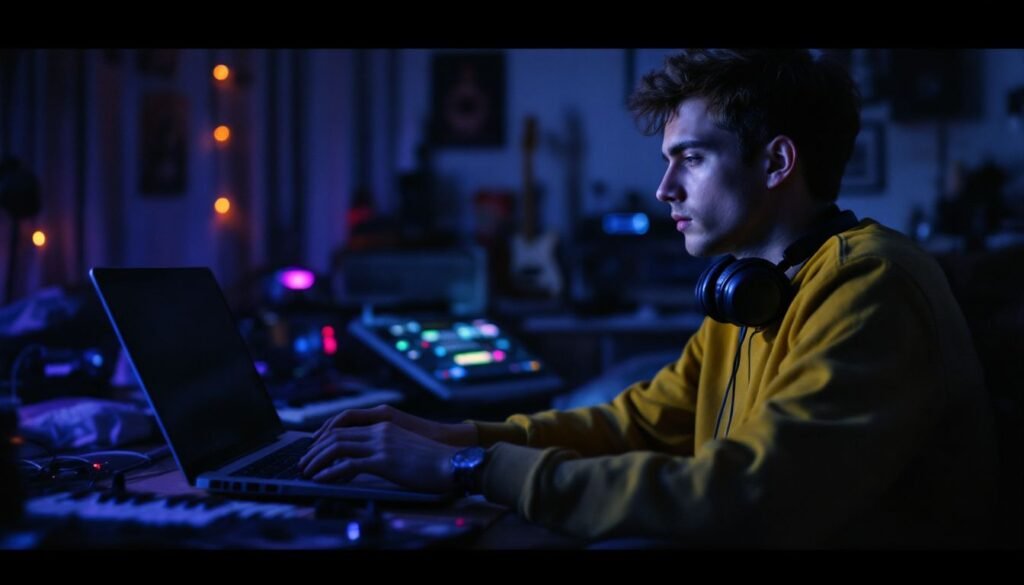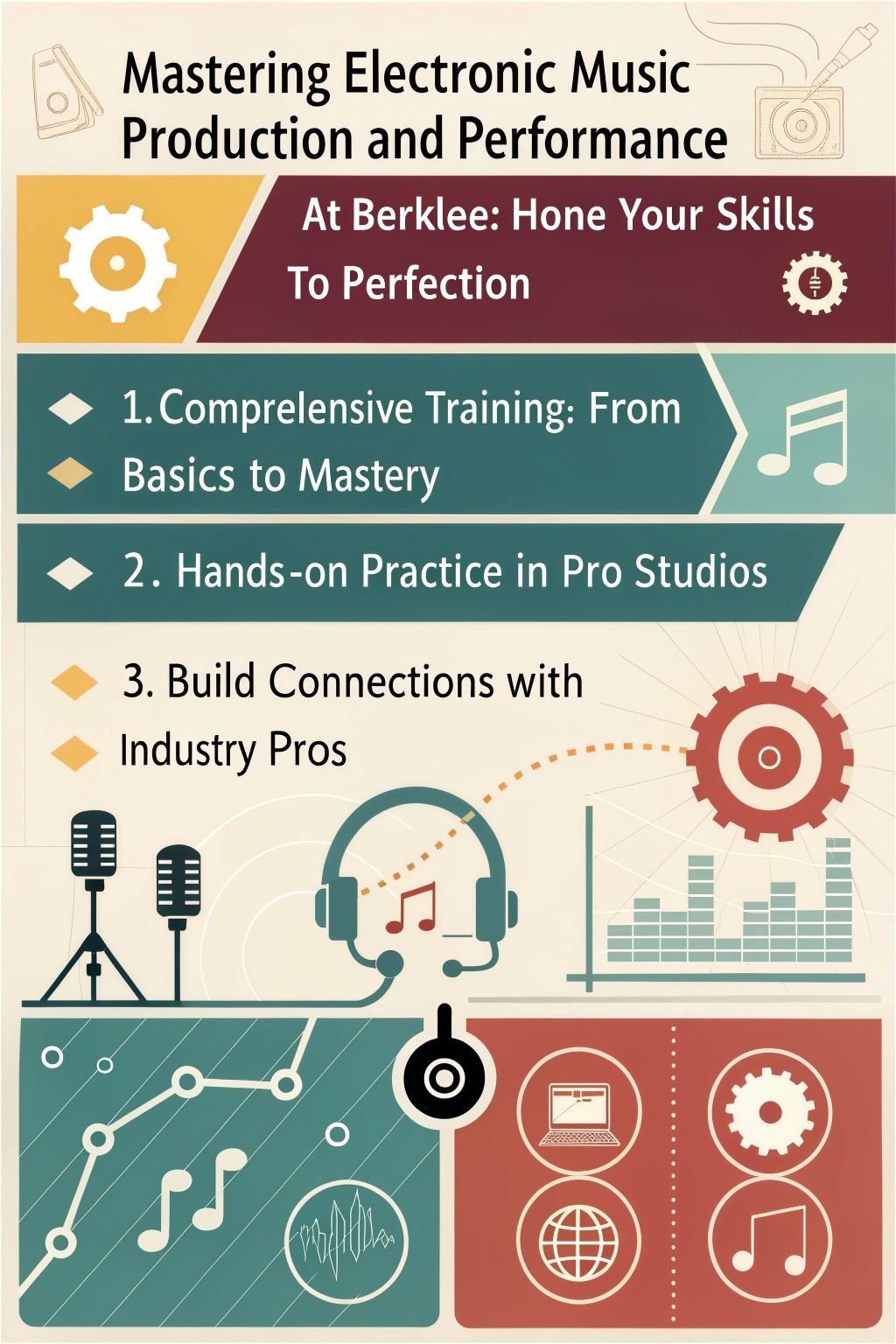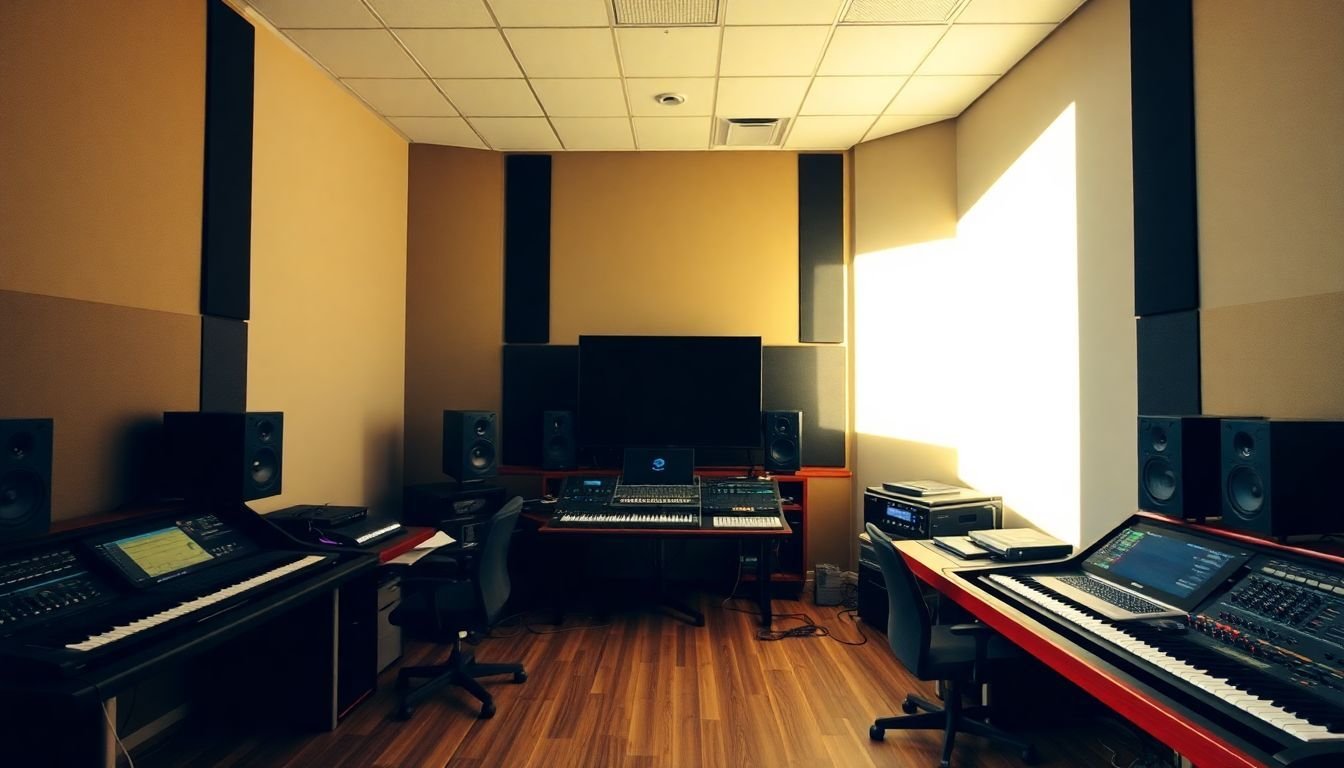
Making great electronic music is hard. Berklee offers a top programme in electronic music production and performance. This article shows how to master your skills there. Read on, it’s exciting!

Overview of the Electronic Music Production and Performance Programme at Berklee

Discover the ins and outs of Berklee’s Electronic Music Production and Performance Programme, including its course structure and key learning outcomes. Explore creative music production, electronic music performance technologies, unrivaled studio time, purpose-built DJ booths, sound design techniques using synthesis and sampling tools.
Course structure
Berklee’s Electronic Music Production and Performance programme is structured to professionally develop you. It provides guidance at every step, from the rudimentary aspects to on-stage performance.
• In the first year, the emphasis is on consolidating a strong base. You gain knowledge on studio recording, organising melodies, using drum machines for beats, and sound designing. This year establishes the direction for crafting your distinctive sound.
• Essential subjects include the usage of digital audio workstations (DAWs) like Ableton Live and Logic Pro. Practical experience is gained with synthesizers, MIDI controllers, and diverse music software. This training aids in transforming your musical ideas into tangible results.
• The second year initiates a more profound understanding of advanced skills. The concepts of mixing and mastering are introduced, teaching you to refine your musical compositions. Furthermore, you will delve into music hardware and software, learning about the creation of electronic instruments.
• Acute listening abilities are honed in the second year. This sharpens your understanding of music — identifying what requires alteration or enhancement in your production.
• Subsequent phases present crucial project modules – PUSH1: FRAME, PUSH2: INVENT, PUSH3: LAUNCH. These projects push you to convert all learnings into tangible deliverables, such as launching an EP or playing live.
• There are opportunities for smaller projects that facilitate further examination. This could be from an in-depth study into modular synthesis in PUSH4: PROCESS or crafting an exhaustive thesis in PUSH5: DISSERTATION on a topic that piques your interest.
To attain the degree, gathering a total of 120 credits is compulsory. This prerequisite assures that, by the conclusion of your journey at Berklee, you have fully comprehended and mastered the entire range of electronic music production and performance, priming you for the international platform.
Key learning outcomes
At Berklee, music producers have the opportunity to polish their artistry to its finest point. The Electronic Music Production and Performance Programme provides an abundance of talents and knowledge.
- You will receive tuition on advanced mixing techniques, ensuring your melodies resonate beautifully on any speaker.
- Proficiency in mastering is included within the programme, preparing your compositions for global listeners.
- You will familiarly understand production techniques that assist in creating music of any genre.
- The curriculum imparts performance capacity, ensuring your level of comfort on live stages.
- Your personal musical expressions will receive encouragement. Discover your distinctive rhythm and style.
- Lessons in identifying chord progressions are provided, facilitating the creation of captivating tunes that linger in listeners’ minds.
- Techniques on arrangement hold importance. Understand the best ways to seamlessly unify parts of a song.
- Strategies for commercial success are discussed, providing guidance on monetising your compositions.
- You’ll nurture a personal artistic identity to maintain your uniqueness in the music industry.
- Advice is provided by Berklee-trained mentors who have a thorough understanding of the industry.
These results equip you for a thriving career in electronic music, whether you envision yourself as a DJ, producer, or sound engineer.
Developing Your Artistic Voice
When developing your artistic voice, you’ll explore creative music production using a range of electronic music tools and immerse yourself in the realm of contemporary music. Mastering live electronic performance skills will help reveal the secrets behind creating a unique sound that stands out in the world of electronic music production.
Creative music production
Creative music production involves crafting a distinctive auditory signature. A range of over 200 courses pertaining to music production and software waits for you at Berklee. Envisage the possibilities of mix mastering and finessing your tracks with top-tier tools.
Accompanied by fellow learners, you can gain and contribute insight in an environment that values every student’s development.
“Mixing and mastering at Berklee transcends traditional learning; it’s the fabrication of your future soundtrack.”
Expect to utilise cutting-edge equipment, including synthesizers and software from Native Instruments in a dynamic course formulated for immersive learning. Whether you’re adding your spin to a track or initiating a fresh project, these tools aid in realising your vision.
Moreover, distance learners gain insights from acclaimed educators from the comfort of their personal workspace, ensuring universal access to skill refinement opportunities.
Electronic music performance technologies
Electronic music performance technologies have changed the game. You’ll find yourself diving deep into a world where electronic instruments and MIDI controllers are your best friends.
At Berklee, the focus is on making you skilled in performing live electronic music. Here, purpose-built DJ booths become your playground. You get to mix sounds and create vibes that are entirely new.
Learning strategies for performing live make all the difference. It’s not just about pushing buttons; it’s about bringing tracks to life on stage. The programme uses current music production techs at its core.
Students learn to integrate these tools seamlessly into their performances, ensuring they master both the creative and technical sides of live shows.
The Technological Playground
Explore Berklee’s state-of-the-art studio facilities, equipped with cutting-edge technology for music production and performance. Gain hands-on experience in purpose-built DJ booths to hone your craft in a real-world setting.
Access to unrivalled studio time
Berklee’s programme offers something unique for music producers. You get to use the studio from 9 am to 10 pm during the week and 10 am to 6 pm on weekends. This means more time for you to hone your skills, experiment, and create amazing music.
With ten recording and mixing studios plus live venue spaces and DJ booths, there’s no shortage of professional-grade equipment.
The difference between a good track and a great one often comes down to how much time you spend on it.
You can work with everything from high-end sound mixers to electronic musical instruments. And not just any tools – they are state-of-the-art. Imagine having all these at your disposal in a place where practice makes perfect is not just an idea but a reality.
Here, extensive hands-on practice isn’t just encouraged; it’s part of your daily routine.
Utilisation of purpose-built DJ booths
Purpose-built DJ booths at Berklee are set up for both degree and certificate students. These booths come with all you need to mix and make music live. They have modern features fit for today’s DJing scene.
This means students get hands-on with real gear used in clubs and stages around the world.
These booths link directly to electronic music production studies. Here, you learn foundational techniques for DJing along with how to use MIDI controllers and mixers effectively. It’s all about putting what you’ve learned into practice, making your transition from studio to stage smoother.
This setup helps boost confidence in performing live, preparing you better for the music industry ahead.
Training Your Ear for Music Production
Training your ear for music production is a crucial skill. Allan Chase and Roberta Radley, who are experts in the field, designed the “Ear Training 1” course. This course helps over 30,000 students from more than 140 countries improve their listening skills.
It is part of a big program that teaches theories and techniques for different music styles.
In this training, you will do practical exercises to get better at hearing and interacting with music. The goal is to make your ears sharp so you can produce great sound. This skill lets you work well with any genre of music and gives you an edge as a producer or composer.
Transitioning from Studio to Stage
In transitioning from studio to stage, you’ll explore live electronic music performance and integrating electronic instruments and MIDI controllers. You’ll develop a unique artistic voice as you put your ideas into practice.
Live electronic music performance
The Live electronic music performance programme at Berklee focuses on enhancing performance skills for live electronic music. It examines various live performance strategies and prepares students for professional settings.
The curriculum emphasises techniques relevant to the contemporary electronic dance music production, including sound design and arrangement. Students generate original content using Ableton Live Suite, gaining practical skills to transition from studio to stage.
Live electronic music performances are not just about creating sounds but also about mastering the art of engaging with audiences through technology.
Integrating electronic instruments and MIDI controllers
Integrating electronic instruments and MIDI controllers enhances creativity and streamlines workflow in music production. Here’s how it supports transitioning from studio to stage, facilitates communication between devices for music creation, and integrates electronic instruments in live performances:
- Streamlining Workflow: MIDI controllers transmit data to control software instruments and Digital Audio Workstations (DAWs), enhancing the creative process and boosting efficiency.
- Live Performance Integration: MIDI controllers are essential for seamlessly integrating electronic instruments into live performances, allowing for dynamic and expressive onstage interaction.
- Effective Communication: These controllers enable reliable communication between devices, facilitating collaborative music creation across different platforms or hardware setups.
- Flexibility for Different Needs: Various types of MIDI controllers cater to different user needs, offering a wide range of options for producers and performers to explore.
These integrations not only streamline the production process but also offer immense potential for dynamic live performances using electronic instruments.
Advanced Techniques and Professional Preparation
Entering the advanced world of techniques and professional preparation, you’ll explore detailed sound, synthesis, and sampling methods essential for electronic music production. Moreover, integrating cutting-edge technology such as modular synthesizers and mixing consoles will support your continuously developing expertise in electronic music production.
Sound, synthesis & sampling
Mastering sound, synthesis, and sampling is vital for electronic music producers to create innovative and cutting-edge music. At Berklee’s Electronic Music Production and Performance Programme, you’ll acquire practical skills in advanced sound design techniques such as additive, FM, and sampling.
The programme emphasises the use of raw and electronic sound material for film scores. Through hands-on activities with hardware and software synthesis systems, you’ll develop a deep understanding of these concepts that form the foundation of electronic music production.
Throughout the course, you’ll immerse yourself in a technological playground where you can explore a wealth of experience in using a variety of tools and techniques related to sound engineering.
With an eye toward professional development, the programme equips students with technical and creative skills needed for success in today’s ever-changing world of electronic music production.
Major project and live performance preparation
When it comes to preparing for major projects and live performances at Berklee’s Electronic Music Production and Performance Programme, you’ll explore modern electronic dance music production techniques.
Students analyse electronic music in preparation for performances, focusing on enhancing performance skills specifically for live electronic music. The course MTI-523 emphasises performance techniques and utilises Ableton Live Suite for generating original content.
Also, the programme is offered in Valencia during the Fall semester.
In this module, students gain practical experience that supports their transition from studio-based work to live electronic music performances. With a focus on modern electronic dance music production, students will prepare major projects while honing their skills in working with advanced technologies like purpose-built DJ booths.
Moreover, the programme offers unparalleled studio time to develop a strong understanding of electronic music production and bring forth creative excellence when performing live.
Faculty and Mentorship
Faculty at Berklee’s Electronic Music Production and Performance programme include leading industry experts who bring real-world experience to the classroom. Personalised guidance is provided to help students develop their unique sound, with mentors offering support every step of the way.
Learn from leading industry experts
At Berklee, you get to learn from award-winning artists. The faculty includes Daedelus, Spencer Bambrick, Jeff Baust, and Zebbler Peter Berdovsky. These industry professionals provide mentorship and insights to help you in your electronic music career journey.
You’ll receive individualised attention which ensures a high-quality education experience.
Personalised guidance and support
At Berklee, as a music producer, you’ll receive personalised guidance and support from faculty dedicated to your success. Small class sizes capped at 20 students ensure individual mentorship with an emphasis on enhancing the learning experience.
Moreover, Berklee-trained Academic Advisors will guide you through the programme, resulting in positive experiences reflected in a 97% student satisfaction rate. This attention towards each student’s progress ensures that you gain practical skills crucial for your career as a music producer.
The tailored attention provided by faculty members is intended to enhance your artistry and professionalism, ensuring a continuously developing set of skills directed towards navigating the intricacies of electronic music production and performance.
With this careful approach being the foundation of our educational ethos, you can rely on Berklee not only for academic excellence but also for providing first-hand experience in the modern music technology realm.
Career Opportunities Post Graduation
After graduation, there are various career paths to explore, such as becoming a record producer, audio engineer, or live electronic music performer. Opportunities also exist in sound design, remixing, and mastering audio for diverse media like film or multimedia projects.
Potential music career roles
As an electronic music producer, consider these potential music career roles:
- Sound Production: Create and develop sound for various media, including film and video games.
- Remix Production: Generate new versions of existing songs by adjusting elements like tempo or instrumentation.
- Sound Crafting: Formulate auditory experiences for multimedia, film, or gaming projects.
- Artist Representation: Guide and support musicians in steering their careers, managing bookings, and promoting their work.
- Sound Expert: Provide expertise on sound-related matters for architectural or environmental projects.
- ADR Supervisor: Oversee Additional Dialogue Replacement (ADR) sessions in film and television production.
- Support Engineer: Aid the main engineer in a studio environment, managing technical tasks and assisting with recording sessions.
- Audio Leadership: Head the audio team in developing soundscapes and effects for games or interactive media.
These roles offer diverse opportunities to apply your skills and knowledge within the music industry.
Networking and partnerships within the industry
Throughout the programme, you’ll have abundant opportunities to connect and collaborate with key players in the electronic music scene. Berklee has established strong partnerships within the industry, offering students real-world experience and networking connections.
These partnerships include collaborative projects with renowned entities such as Rundfunk-Sinfonieorchester Berlin, The Catties awards ceremony and Pulse mini festival, along with participation in Mensch, Musik! concert series.
This emphasis on practical engagement not only enhances your skills but also opens doors to potential career avenues post-graduation in a rapidly evolving music landscape.
Conclusion
Mastering electronic music production and performance at Berklee equips you with the skills to excel in today’s dynamic music industry. Delve into a programme crafted to elevate your creative and technical abilities, unveiling the intricacies of sound recording and synthesis.
Access state-of-the-art tools, from studio equipment to electronic instruments, customised to refine your craft. Join leading industry experts in a realm dedicated to nurturing your unique artistic voice.
Embark on this journey towards becoming a proficient music producer and performer—an experience that extends beyond traditional degree courses. It’s about achieving your full potential in the vibrant world of electronic music production.
References
- https://online.berklee.edu/music-degrees/undergraduate/electronic-music-production-and-sound-design
- https://online.berklee.edu/courses
- https://online.berklee.edu/courses/creative-music-production-skills
- https://online.berklee.edu/music-production
- https://assets.online.berklee.edu/handbooks/berklee-online-electronic-music-production-and-sound-design-handbook.pdf
- https://college.berklee.edu/courses/ep-440
- https://college.berklee.edu/mpe
- https://college.berklee.edu/courses/isel-250
- https://online.berklee.edu/courses/ear-training-1
- https://online.berklee.edu/courses/interest/music-production
- https://college.berklee.edu/courses/mti-523
- https://online.berklee.edu/help/en_US/midi/1964593-overview-of-midi-controllers (2024-03-12)
- https://college.berklee.edu/courses/ep-322
- https://online.berklee.edu/
- https://college.berklee.edu/mpe/careers
- https://college.berklee.edu/electronic-production-and-design/careers

